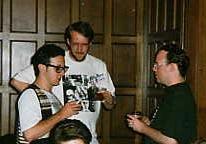 |
|
 |
||||||
The harsh laws against the possession and sale of crack are an example of unintentional bias. There are three kinds of racism. First is intentional racism, such as segregated schools. Second is legacy racism, the current effects of past racism, such as black kids growing up with less wealth and power not because anyone's discriminated against them personally but because people discriminated against their parents, their grandparents, etc. (This second type of racism is the most prevalent one in the US, as far as blacks are concerned.) Third is unintentional bias, which is current but accidental bias. The harsh laws against crack cocaine are an example of unintentional bias. Federal sentencing guidelines for crack are much harsher than they are for powder cocaine. When the Justice Department cut the extreme sentences for powder cocaine, they tried to cut the extreme sentences for crack cocaine, as well. But Congress intervened and overruled the Justice Department-for crack and not for powder. Many inmates in federal prisons for powder cocaine were set free, but those in prison for crack saw their promised release taken away. Having or selling crack gets you a much stiffer punishment than having or selling the same amount of powder. Not coincidentally, crack is disproportionately popular among black drug users. Powders is disproportionately popular among whites. Some people will tell you that the lawmakes intentionally keep the penalties for crack high in order to imprison more blacks, but that's a hard case to make. A more reasonable expalanation is that cultural bias makes lawmakers (and voters) less concerned with the large number of people getting thrown into prison for crack. At every step, the voters, the lawmakers, the police, the juries, and the judges can say that they're not trying to put blacks in prison. They're simply passing and enforcing laws equally (and this particular law happens to fall extra hard on blacks). Defenders of the crack laws will say that crack is a scourge and that the stiff sentences are just. The problem with identifying unintentional bias is that its proponents don't think they're being biased, so we're left with making judgment calls to identify it. Do people see crack as a scourge partly because it's more popular among blacks? Do they see the stiff sentences as just partly because the people being sent to prison are disproportionately poor blacks? If middle class whites were the ones using crack, would we have different attitudes about how scary it is and how deserving its users and sellers are of hard time? It's hard to prove that the answers to these questions are Yes, but it's hard to believe that the answers are No. —JoT See also Crack Baby Epidemic. |
||||||